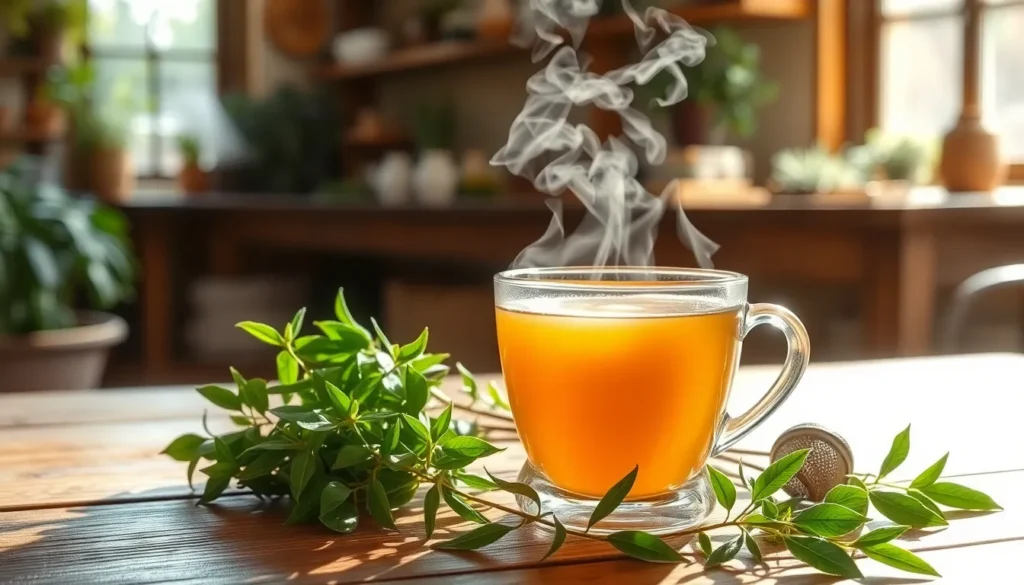Te de ruda, or rue tea, has been a staple in traditional herbal medicine for centuries. Known for its distinctive aroma and bitter taste, this infusion is celebrated not just for its flavor but for its myriad of health benefits. Many cultures believe in its powerful properties, making it a popular choice for those seeking natural remedies.
From aiding digestion to promoting relaxation, te de ruda serves various purposes that align with holistic wellness practices. As more people turn to natural solutions for their health needs, understanding the uses and benefits of rue tea becomes essential. This article delves into the fascinating world of te de ruda, exploring its traditional uses and the science behind its effectiveness.
Table of Contents
ToggleWhat Is Te De Ruda?
Te de ruda, known as rue tea in English, is an herbal infusion made from the leaves of the rue plant (Ruta graveolens). This tea features a distinctive bitter flavor and aromatic profile, which many find unique. Traditionally, cultures worldwide have utilized rue tea for its medicinal properties.
Rue tea serves various health purposes, including digestive aid, menstrual support, and stress relief. This herbal remedy contains compounds like flavonoids and alkaloids that may contribute to its therapeutic effects. Studies suggest that these components might offer anti-inflammatory and antimicrobial benefits, although more research is essential to fully substantiate these claims.
Rue tea also holds cultural significance. Many people incorporate it into rituals for purification and protection. Understanding both its traditional uses and contemporary applications ensures a comprehensive view of te de ruda’s relevance in today’s health landscape.
Health Benefits of Te De Ruda

Te de ruda, or rue tea, offers several notable health benefits supported by its traditional use and active compounds. Below are key areas where rue tea demonstrates positive effects.
Digestive Health
Rue tea effectively aids digestion by stimulating appetite and reducing bloating. Compounds in the tea, including flavonoids and alkaloids, promote digestive enzyme production, enhancing overall gastrointestinal function. Many individuals use rue tea for nausea relief, as it can soothe the stomach and alleviate indigestion.
Menstrual Relief
Rue tea serves as a natural remedy for menstrual discomfort. It may help alleviate cramps and regulate irregular cycles due to its antispasmodic properties. Traditionally, women have consumed rue tea to ease pain and promote menstrual flow. However, caution is advised, as excessive consumption can lead to adverse effects.
Mood Enhancement
Rue tea contributes to mood enhancement and relaxation. Its calming effects can reduce anxiety and help manage stress levels. The tea’s compounds may support a sense of well-being, making it a popular choice for individuals seeking natural mood support. Routine consumption can improve resilience against emotional fluctuations.
Traditional Uses of Te De Ruda
Te de ruda, or rue tea, has a rich history in traditional medicine, often serving both health and cultural purposes in various societies. Its applications extend beyond mere consumption to include its role in rituals and remedies.
Cultural Significance
Te de ruda holds deep cultural significance in many regions. In certain cultures, it symbolizes protection and purification. People often use it during rituals to ward off negative energies or influences. Historical references indicate its use in celebrations and traditional ceremonies, highlighting its importance in communal practices. Additionally, some cultures regard rue as a sacred plant, incorporating it into spiritual remedies to enhance mental clarity and emotional well-being.
Folklore and Remedies
Folklore surrounding te de ruda is extensive, as it is believed to possess potent protective qualities. Many traditional remedies involve using rue tea for various ailments, such as headaches, digestive issues, and menstrual discomfort. It has also been sought after for its supposed ability to deter evil spirits and negative thoughts. Some will recommend rue tea for enhancing fertility or providing relief during pregnancy, though its use in this respect should be approached cautiously. These beliefs reflect the intertwining of herbal practices with cultural narratives, showcasing the tea’s enduring place in traditional healing.
How to Prepare Te De Ruda
Preparing te de ruda involves a few simple steps that highlight its natural properties and flavors.
Ingredients Needed
- Dried rue leaves: Use 1-2 tablespoons, known for their strong flavor and aroma.
- Water: Utilize 2 cups of fresh water to properly extract the beneficial compounds.
- Optional sweetener: Consider honey or sugar for those who prefer a sweeter taste.
Brewing Instructions
- Boil water: Bring 2 cups of water to a rolling boil in a pot or kettle.
- Add rue leaves: Stir in 1-2 tablespoons of dried rue leaves once the water reaches boiling point.
- Steep: Let the mixture simmer for about 10-15 minutes, allowing the flavors and beneficial properties to infuse into the water.
- Strain: Remove the pot from heat, and strain the tea into a cup to separate the leaves from the liquid.
- Serve: Enjoy the tea hot, adding your choice of sweetener if desired.
Potential Side Effects and Precautions
Rue tea contains active compounds that may cause side effects in some individuals. Users should be aware of potential adverse reactions such as:
- Digestive Issues: Some people experience nausea, vomiting, or diarrhea after consuming rue tea. These symptoms may result from the bitter compounds present in the tea.
- Allergic Reactions: Individuals may develop skin rashes, itching, or other allergic responses. Users with allergies to plants in the Rutaceae family should exercise caution.
- Pregnancy Risks: Rue tea can stimulate uterine contractions and may pose risks during pregnancy. Pregnant individuals should avoid drinking rue tea due to potential miscarriage or preterm labor.
- Liver Toxicity: High doses of rue can cause liver damage. It’s important to consume rue tea in moderation and consult a healthcare professional for guidance.
- Interactions with Medications: Rue tea may interact with various medications, particularly those affecting the liver or blood pressure. Users should discuss consumption with their healthcare provider before combining it with prescription medications.
- Sun Sensitivity: Rue contains compounds that might increase sensitivity to sunlight, leading to skin irritation. Users should limit sun exposure after consuming rue tea.
Maintaining moderation while enjoying the potential health benefits of rue tea ensures minimized risks. Always consult a healthcare professional before adding new herbal remedies to your wellness routine, especially with underlying health conditions.
Te de ruda stands out as a remarkable herbal remedy with a rich history and diverse applications. Its potential benefits for digestion menstrual support and relaxation make it an appealing choice for those seeking natural alternatives. While its cultural significance and traditional uses add depth to its appeal it’s essential to approach rue tea with caution.
Understanding the potential side effects and consulting with a healthcare professional ensures a safe experience. By incorporating te de ruda into a wellness routine individuals can explore its unique properties while respecting its powerful heritage.




